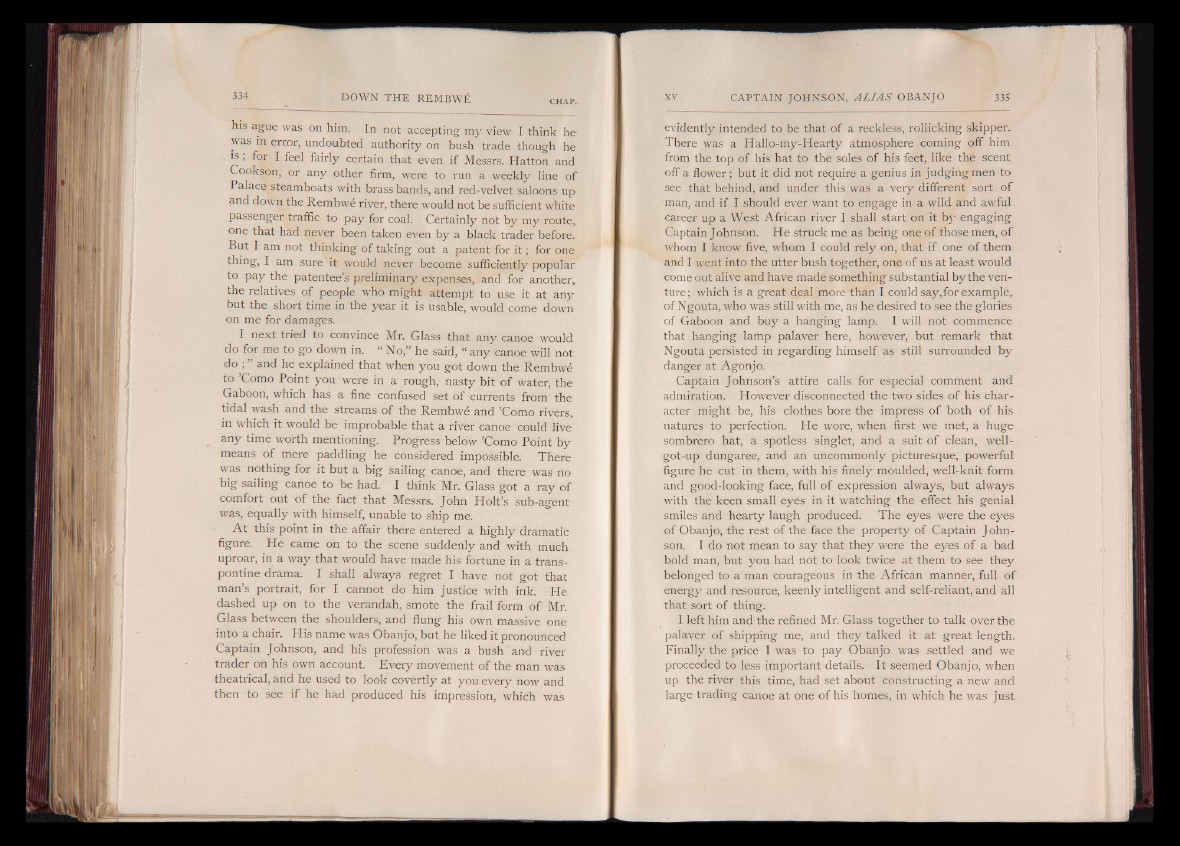
his ague was on him. In not accepting my view I think he
was in error, undoubted authority on bush trade though he
i s ; for I feel fairly certain that even if Messrs. Hatton and
Cookson, or any other firm, were to run a weekly line of
Palace steamboats with brass bands, and red-velvet saloons up
and down the Rembwd river, there would not be sufficient white
passenger traffic to pay for coal. Certainly not by my route,
one that had never been taken even by a black trader before.
But I am not thinking of taking out a patent for i t ; for one
thing, I am sure it would never become sufficiently popular
to pay the patentee’s preliminary expenses, and for another,
the relatives of people who might attempt to use it at any
but the short time in the year it is usable, would come down
on me for damages.
I next tried to convince Mr. Glass that any canoe would
do for me to go down in. “ No,” he said, “ any canoe will not
do ; ” and he explained that when you got down the Rembwe
to ’Como Point you were in a rough, nasty bit of water, the
Gaboon, which has a fine confused set of currents from the
tidal wash and the streams of the Rembwe and ’Como rivers,
in which it would be improbable that a river canoe could live
any time worth mentioning. Progress below ’Como Point by
means of mere paddling he considered impossible. There
was nothing for it but a big sailing canoe, and there was no
big sailing canoe to be had. I think Mr. Glass got a ray of
comfort out of the fact that Messrs. John Holt’s sub-agent
was, equally with himself, unable to ship me.
A t this point in the affair there entered a highly dramatic
figure. He came on to the scene suddenly and with much
uproar, in a way that would have made his fortune in a transpontine
drama. I shall always regret I have not got that
man’s portrait, for I cannot do him justice with ink. He
dashed up on to the verandah, smote the frail form of Mr.
Glass between the shoulders, and flung his own massive one
into a chair. His name was Obanjo, but he liked it pronounced
Captain Johnson, and his profession was a bush and river
trader on his own account. Every movement of the man was
theatrical, and he used to look covertly at you every now and
then to see if he had produced his impression, which was
evidently intended to be that of a reckless, rollicking skipper.
There was a Hallo-my-Hearty atmosphere coming off him
from the top of his hat to the soles of his feet, like the scent
off a flower; but it did not require a genius in judging men to
see that behind, and under this was a very different sort o f
man, and if I should ever want to engage in a wild and awful
career up a West African river I shall start on it by engaging
Captain Johnson. He struck me as being one of those men, o f
whom I know five, whom I could rely on, that if one of them
and I went into the utter bush together, one of us at least would
come out alive and have made something substantial by the venture;
which is a great deal more than I could say, for example,
of Ngouta, who was still with me, as he desired to see the glories
of Gaboon and buy a hanging lamp. I will not commence
that hanging lamp palaver here, however, but remark that
Ngouta persisted in regarding himself as still surrounded by
danger at Agonjo.
Captain Johnson’s attire calls for especial comment and
admiration. However disconnected the two sides of his character
might be, his clothes bore the impress of both of his
natures to perfection. He wore, when first we met, a huge
sombrero hat, a spotless singlet, and a suit of clean, well-
got-up dungaree, and an uncommonly picturesque, powerful
figure he cut in them, with his finely moulded, well-knit form
and good-looking face, full of expression always, but always
with the keen small eyes in it watching the effect his genial
smiles and hearty laugh produced. The eyes were the eyes
of Obanjo, the rest of the face the property of Captain Johnson.
I do not mean to say that they were the eyes of a bad
bold man, but you had not to look twice at them to see they
belonged to a man courageous in the African manner, full o f
energy and resource, keenly intelligent and self-reliant, and all
that sort of thing.
I left him and the refined Mr. Glass together to talk over the
palaver of shipping me, and they talked it at great length.
Finally the price I was to pay Obanjo was settled and we
proceeded to less important details. It seemed Obanjo, when
up the river this time, had set about constructing a new and
large trading canoe at one of his homes, in wffiich he was just